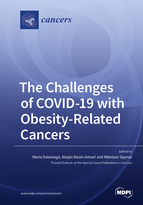The Challenges of COVID-19 with Obesity-Related Cancers
A special issue of Cancers (ISSN 2072-6694). This special issue belongs to the section "Cancer Epidemiology and Prevention".
Deadline for manuscript submissions: 25 April 2024 | Viewed by 43728
Special Issue Editors
Interests: biomarkers; metabolism; cancer; inflammation; microbiome; cardiometabolic disorders
Interests: cardiometabolic diseases; NAFLD; CVDs; atherosclerosis; diabetes; inflammation; nuclear receptors; circadian clock system
Special Issue Information
Dear Colleagues,
The emergence of COVID-19 has created an unprecedented threat worldwide. The COVID-19 pandemic has taken place at a time when the worldwide prevalence rate of overweight and obesity is greater than 39% for adults, and cancer is a leading cause of death globally based on WHO data. Interestingly, obesity has been reported as a significant risk factor for the severity of COVID-19. Moreover, there is convincing evidence that excess body weight is associated with an increased risk for cancer of at least 13 anatomic sites, including endometrial, esophageal, renal and pancreatic adenocarcinomas; hepatocellular carcinoma; gastric cardia cancer; meningioma; multiple myeloma; colorectal, postmenopausal breast, ovarian, gallbladder and thyroid cancers.
Cancer patients may be more susceptible to being infected with the SARS-CoV-2 virus. Patients with ongoing or recent cancer treatment for advanced active disease, metastatic solid tumors and hematological malignancies present an elevated risk of severe COVID-19, hospitalization and mortality. This Special Issue will place emphasis on the challenges surrounding COVID-19- and obesity-related cancers, including, but not limited to: risk factors of severe COVID-19 in cancer patients; complications of COVID-19 in cancer patients; challenges in cancer treatment and surgery; guidelines for cancer care during COVID-19; delayed diagnosis and suboptimal cancer management; impact of COVID-19 on cancer screening, early diagnosis and cancer presentation; immune response after SARS-CoV-2 infection and vaccination in cancer patients; psychological distress among cancer survivors; telehealth in cancer care; role of diet and nutraceuticals in the prevention of severe COVID-19 and cancer; effects of COVID-19 pandemic on cancer research, etc.
Based on your expertise in this field, we would like to invite you to contribute with a review or research paper for peer review and possible publication in this Special Issue. Cancers is indexed in PubMed and SCIE with an Impact Factor of 6.639 (2020).
Prof. Dr. Maria Dalamaga
Dr. Narjes Nasiri-Ansari
Dr. Nikolaos Spyrou
Guest Editors
Manuscript Submission Information
Manuscripts should be submitted online at www.mdpi.com by registering and logging in to this website. Once you are registered, click here to go to the submission form. Manuscripts can be submitted until the deadline. All submissions that pass pre-check are peer-reviewed. Accepted papers will be published continuously in the journal (as soon as accepted) and will be listed together on the special issue website. Research articles, review articles as well as short communications are invited. For planned papers, a title and short abstract (about 100 words) can be sent to the Editorial Office for announcement on this website.
Submitted manuscripts should not have been published previously, nor be under consideration for publication elsewhere (except conference proceedings papers). All manuscripts are thoroughly refereed through a single-blind peer-review process. A guide for authors and other relevant information for submission of manuscripts is available on the Instructions for Authors page. Cancers is an international peer-reviewed open access semimonthly journal published by MDPI.
Please visit the Instructions for Authors page before submitting a manuscript. The Article Processing Charge (APC) for publication in this open access journal is 2900 CHF (Swiss Francs). Submitted papers should be well formatted and use good English. Authors may use MDPI's English editing service prior to publication or during author revisions.
Keywords
- biomarkers
- cancer
- cancer care
- COVID-19
- inflammation
- immune response
- metabolic disorders
- obesity
- psychological distress
- screening
- telehealth
- vaccines







